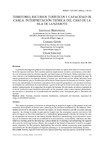Please use this identifier to cite or link to this item:
https://accedacris.ulpgc.es/jspui/handle/10553/59092
| Title: | Territorio, recursos turísticos y capacidad de carga. Una interpretación teórica del caso de la isla de Lanzarote | Authors: | Hernández Torres, Santiago Ginés de la Nuez, Carmen Sánchez Suárez, César |
UNESCO Clasification: | 531290 Economía sectorial: turismo | Keywords: | Turismo Recursos turísticos territoriales Ordenación del territorio Capacidad de carga Sostenibilidad turística, et al |
Issue Date: | 2005 | Journal: | Vegueta: Anuario de la Facultad de Geografía e Historia | Abstract: | La presente investigación propone una interpretación sobre un aspecto relevante en el actual desarrollo
de los espacios turísticos. Esta cuestión presenta implicaciones sociales y económicas, y está referida
a las relaciones entre los distintos agentes que intervienen en el territorio. Dichas relaciones se asocian,
a su vez, a las transformaciones en los recursos turísticos del espacio y su capacidad de carga. Se
intenta profundizar en los aspectos teóricos y factores que intervienen en este último indicador como
criterio fundamental para la cualificación del territorio como soporte del turismo en Canarias. Apoyado
en una metodología de inventario exhaustivo de los aspectos geográficos y los recursos turísticos,
se delimitan los indicadores de sostenibilidad, a partir de los que se extrae un modelo crítico de valoración
e interpretación de la capacidad de acogida del turismo. De este modo, se utiliza el ejemplo de
la isla de Lanzarote como laboratorio adecuado a tal fin; poniendo sobre la mesa algunos planteamientos
asociados al desarrollo de la planificación del territorio como instrumento para el desarrollo del
turismo. This research proposes an exercise in interpreting an important aspect of the present social and economic development of tourist areas, referring to the relations established by the different stakeholders involved in the region, between the region, its tourist resources and the so-called carrying capacity. An attempt is made to gain greater insight into the conceptual aspects and factors that have an impact on this latter indicator as a fundamental programmed criterion for zoning the area as a foundation for tourism in the Canary Islands. Based on a methodology of an exhaustive inventory of all elements that could be considered as tourist resources, sustainability indicators are identified as a starting point for developing a critical model for evaluating and interpreting the capacity of an area for receiving tourism. Hence, the example of the Island of Lanzarote is used as an appropriate laboratory for this purpose, highlighting the scientific debate concerning some approaches associated with the development of regional planning as an instrument for formalising tourism. |
URI: | https://accedacris.ulpgc.es/handle/10553/59092 | ISSN: | 1133-598X | Source: | Vegueta: Anuario de la Facultad de Geografía e Historia [ISSN 1133-598X] (9), p. 193-218 | URL: | http://dialnet.unirioja.es/servlet/articulo?codigo=2524945 |
| Appears in Collections: | Artículos |
Page view(s)
48
checked on Aug 3, 2024
Download(s)
31
checked on Aug 3, 2024
Google ScholarTM
Check
Share
Export metadata
Items in accedaCRIS are protected by copyright, with all rights reserved, unless otherwise indicated.
